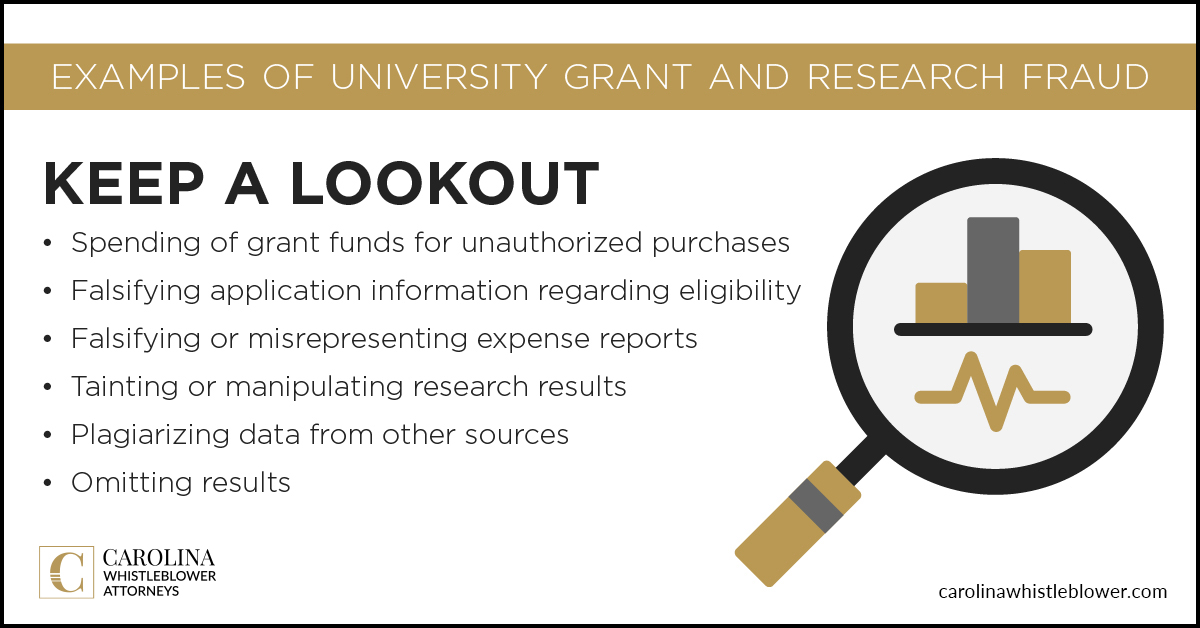Picture this: You are a researcher at a university, and your program receives federal funding to continue this research. You notice that the data being produced does not match up with what is reported. Is someone fudging the numbers? Is there anything you can do? What will it cost you?
This is the scenario a Duke researcher recently found himself in. When he discovered that a fellow researcher helped falsify data to help the university win and maintain profitable grants in violation of the False Claims Act, he had to decide whether or not to pursue a whistleblower case. Ultimately, he made the right choice to blow the whistle. Not only did he save the government – and therefore taxpayers – millions of dollars, but he was also handsomely rewarded to the tune of $33.75 million.1,3
But how did he know something was amiss? How did he figure out he had a case? What actions, or inactions, triggered his suspicion?

Common examples of university grant and research fraud
There are many ways that someone working in a university research setting can commit fraud. Whether it is manipulating data, misusing money, or omitting results, it is defrauding the government and costing taxpayers money.
If you are associated with research grants and suspect your institution may be committing fraud, here are some things you should be on the lookout for:
- Falsifying application information regarding eligibility
- Falsifying or misrepresenting expense reports
- Tainting or manipulating research results
- Overcharging the government for time or materials
- Engaging in or taking advantage of conflicts of interest
- Spending of grant funds for unauthorized purchases
- Plagiarizing data from other sources
- Omitting results
Deciding if you should blow the whistle
If you have witnessed one or more of these fraudulent activities and are considering blowing the whistle, you can ask yourself the following questions:
- Was an application falsified to obtain eligibility that would not otherwise be granted?
- Were there misrepresentations on expense reports?
- Were research results manipulated to portray a different result?
- Were federal grant funds misused, perhaps for personal or otherwise unauthorized purchases?
- Were there conflicts of interest blatantly ignored?
- Did anyone plagiarize their work?
- Were crucial results omitted?
If you answer yes to one or more of these questions, you should consider contacting an experienced whistleblower attorney to discuss your findings and evaluate your case.
Remember: the federal False Claims Act allows you to sue those defrauding the government, both by protecting you against retribution and rewarding you a portion of what the government recovers in a successful claim.3
Institutions hit with whistleblower claims
Fraud in university research institutions is not uncommon. To demonstrate, here is an incomplete list of several institutions that were caught defrauding the government thanks to the help of whistleblowers:
- Northwestern University: Nearly $3 million after allegations arose that one of its former physicians submitted improper claims for reimbursement from the federal grants for professional and consulting services, subcontracts, food, hotels, travel, and other expenses that benefited the physician, his friends, and family.
- Columbia University: $9.5 million for submitting incorrect cost reports and mischarging grants.
- University of Pittsburgh: $132,000 after a professor submitted false documents to the National Science Foundation to secure grant funding.
- Education Management Corp.: $95.5 million after EDMC, the second-largest for-profit education company in the county, allegedly falsely attested that it was in accordance with Title IV of the Higher Education Act (HEA) and correspondent state statutes.
Contact a Carolina Whistleblower Attorney
If you suspect fraud against the federal or state government, please reach out to us. We are here to help you figure out if you have a claim and, if you do, to help you pursue it while remaining protected. We provide experience and confidentiality through our You-First Policy. For a free, confidential evaluation, please contact us or call 1-888-292-8852 today.
Similar Articles
Education Fraud | January 04, 2022
Charter Schools Can Be Sued for False Claims About Enrollment, Programs
The North Carolina Supreme Court recently clarified that charter schools can be sued for...
Education Fraud | May 16, 2019
Duke Whistleblower Case – Would You Have Come Forward?
Here’s a hypothetical “What would you do?” question. You’re working in a research lab and...
Construction Fraud | April 04, 2019
What Are the Potential Rewards of a Successful Whistleblower Lawsuit?
You’ve probably heard the phrase, “If you see something, say something.” While it’s often used...
Contact the Carolina
Whistleblower Attorneys
If you’re wondering if it’s a good idea to speak with a whistleblower lawyer about what you know, let us set the record straight.
- Corporate ethics hotlines can be risky and may lead to termination. If you’ve already done this, call us immediately.
- Your coworkers could be aware of the fraud – or complicit in it – and you should not talk to them about it.
- The first claim to be filed under the False Claims Act can proceed – if you’re not first, you’re at a serious disadvantage and may get nothing (another reason not to speak to your coworkers about it).
- A confidential discussion costs you a few minutes, but could save you time, stress, and money.
"*" indicates required fields
